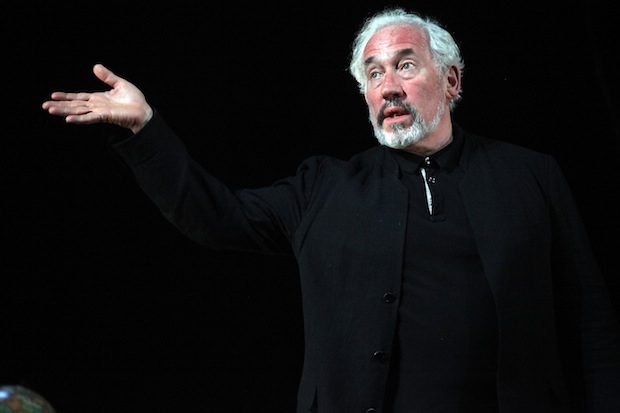Interesting times at Soho Theatre. One of its outstanding shows of last year, Fleabag, was an offbeat Gothic love story written by and starring Phoebe Waller-Bridge. The director of Fleabag, Vicky Jones, has penned another offbeat Gothic love story. And it stars Waller-Bridge. The action plunges us into the weird, manipulative love life of beautiful Jo and her slick older lover Harry. Up goes the curtain and they’re copulating to porn while sharing a bag of Cheesy Wotsits. Harry’s old flame Kerry bursts in and announces that she’s been raped. Harry and Jo console her, rather perfunctorily, and then use her distress to start swapping cynical, sneering accusations about their own relationship.
Already, the audience is gripped. Is this play treating sexual violence as comedy? It looks like it. Kerry, under harsh questioning from Jo, reveals that her ‘rape’ allegation refers to a late-night quickie with her boyfriend for which she gave no explicit consent. Kerry asks Harry to help her get home and Jo advises her to ‘take a dodgy cab, get yourself proper raped, put things in perspective’. Crikey. Not only is sexual abuse being used for larks but the wisecracking characters are female.
The script takes us further into the messed-up love triangle between Jo, Kerry and Harry. All the crooked sources of romance are dissected with scathing wit and frankness: lust and jealousy, fear of boredom, the craving for children, the erotic thrills of recreational violence. It’s a hell of a ride and every moment is enhanced by the amazing performance of Waller-Bridge. Her gift for naturalistic comedy, her searching intelligence and her melancholy glibness come together so forcefully that she risks making the work of her colleagues look a bit ‘thought-out’.
A couple of criticisms spring to mind. At 70 minutes, the play is too short. The spinster-in-waiting Kerry needs to be sexier, so that Harry’s choice between her and the gorgeous Jo acquires a bit more uncertainty. As a writer, Jones is overfond of switching the direction of a scene by getting a character to reveal a deception. ‘I’m pregnant, no I’m not, yes I am, I tricked you, I had an affair, no I didn’t, just testing.’ This prankster technique erodes our trust in the story and becomes predictable. In the final minute, a great heap of falsehoods are detonated all at once and the ending dribbles off into nothing, where it might have been poignant or suggestive. Jones and her fellow artist Waller-Bridge are too smart to have overlooked these small errors. Their freak factory is bubbling and sizzling with weird ideas at the moment and I can’t wait for the next hilarious mutant to come stumbling out of the lab. The duo are presently working in London. Best to catch them soon. I doubt they’ll be here long.
Simon Callow is brightening a corner of the West End with his solo show about Shakespeare. It’s not an impersonation but a genial lecture by a scholarly thesp. Bounding on to the stage in civvies, Callow delivers the Seven Ages of Man speech from As You Like It. This serves as a blueprint for Shakespeare’s life. Lesser-known facts pop up everywhere. ‘The infant mewling and puking in the nurse’s arms,’ quotes Callow. Puking is a word Shakespeare coined. His father, John, was politically ambitious but his first contribution to public life was as Stratford’s official ‘ale taster’. Callow paints Shakespeare’s birthplace as a dozy hick town where a citizen could be fined, as John was, for failing to clear horse dung from outside his house. At 18, Shakespeare was obliged to secure permission from the Church to marry the 26-year-old Anne Hathaway. The paperwork gives his name, appropriately enough, as ‘Shagspeare’.
Callow suggests that Shakespeare’s career as a dramatist had a strong element of serendipity. He arrived in London in his twenties with no point of entry to an established guild or trade. The theatre was a natural haven for an imaginative youngster in need of cash. He began by looking after horses belonging to smart play-goers. Then he took small roles on stage and graduated to script-doctoring and patching up old plays. In 1592, he made his writing debut with Henry VI, which was an instant smash and spawned two sequels. ‘The Henry VI franchise,’ Callow calls it.
This wide-ranging show gives him an opportunity to play any role he fancies from the canon. He throws himself into Mark Antony’s speech over Caesar’s corpse, then he morphs into Falstaff, into Macbeth, into Prospero. He’s surprisingly good as Hermione from The Winter’s Tale. Having treated us to both Dickens and Shakespeare, Callow may be casting about for a modern prodigy to include in his karaoke pantheon. I’d pay good money to see him do Martin Amis.







Comments